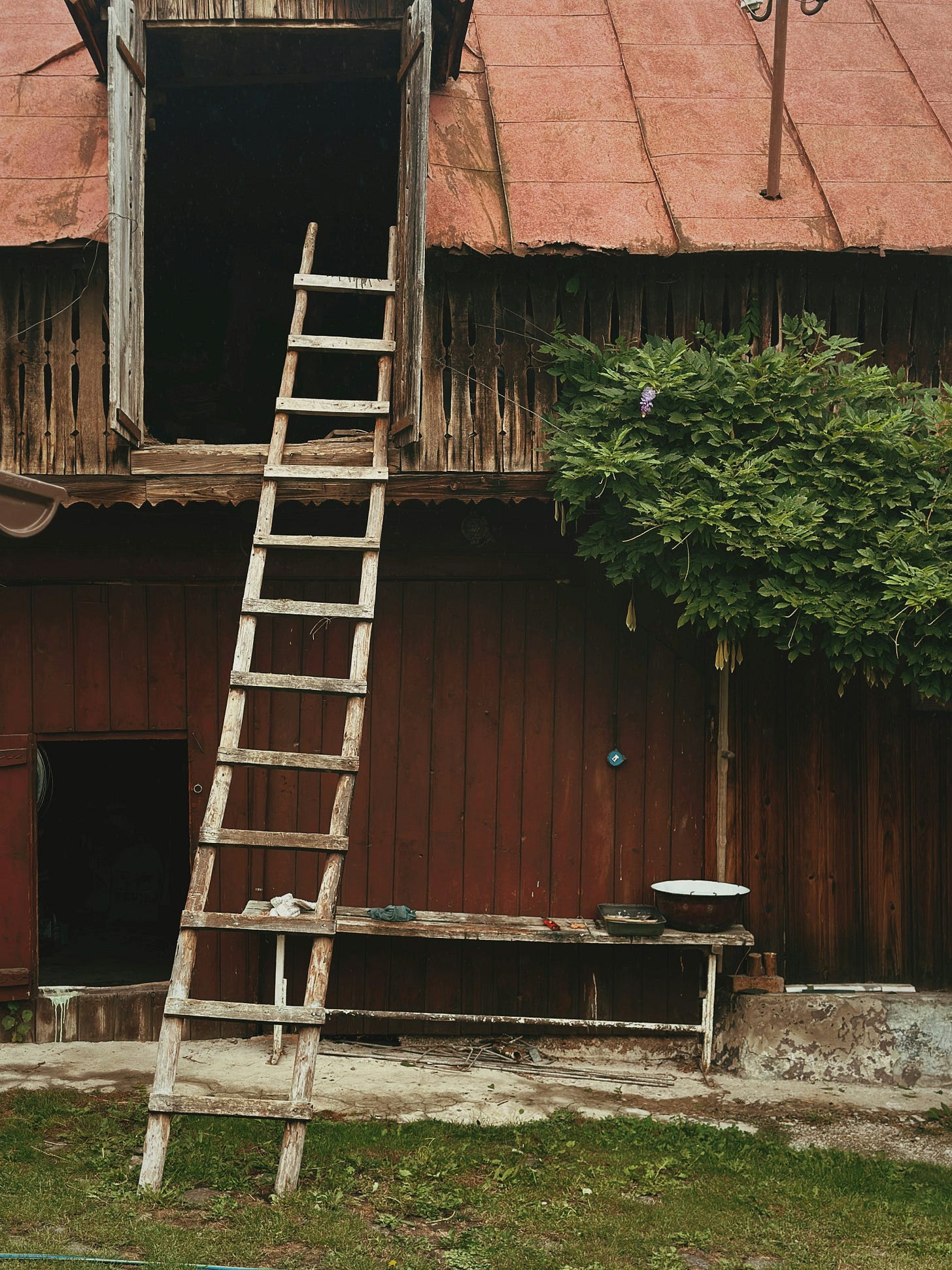An unusual method to get out of eating liver & onions
it's called intentional disruption and I wish I'd used it earlier
Please hit the ❤️ to make sure you don’t get left alone at the table with a plate of liver and onions (keep reading to see what I mean).
It was everything a farm table should be - a scratched up, rectangle taking up the whole space between the cellar and porch doors. The windows that ran along one side of the table seemed huge, but now I know they were not. The other side of the table faced what we called the kitchen — but only held the sink and wood oven. That part of the room also seemed big, but now I know it was not.

When we were all jammed around that table my uncle always sat by the door to the cellar. It had a funky light switch with a little red indicator so when the light was on you could tell by the red glow. As a little kid this seemed to be a very fancy feature but that red indicator light was important because it was supposed to remind us not to turn out the light if someone was down in the very scary cellar that smelled like a room with a dirt floor and no windows because that’s exactly what it was. It was pitch dark down there so, naturally, us kids loved to turn out the light if an adult was down there (and then run like crazy).
One of my grandparents usually sat at the other end of the table, by the door to The Porch. We called it The Porch but it was a multi-purpose room that had been added on to the farmhouse. It always smelled like diesel fuel from the work coats mixed with cooking. Even though The Porch wasn’t the kitchen it was where the cooking was done.
The Porch was also where the big silver separator was. Whoever milked the cows would pour the milk into it and the machine would magically separate the cream from the milk and my grandma would use that cream to make butter. One time my little brother fell bum first into the bucket of milk before it went into the separator. He was stuck in the bucket bum down with his feet out one side and his head, with hair so blonde it was almost white, sticking out the other side of the bucket. It was hilarious but I don’t remember my grandparents laughing about it - or about anything really.
They certainly didn’t laugh when I wouldn’t eat my supper. No one did, especially me.
One of the biggest impressions I have of my childhood is of the countless times I sat at that big farm table, alone and miserable, after everyone was done eating. I would longingly watch out the window as my brother and cousins ran across the grass and through the fence to the barn yard, each step carrying them toward an adventure I would not have. I was stuck on the stool that, only five minutes ago, was wedged between my Mom and my cousin. I couldn’t leave the table, or have dessert, until I finished my dinner. Often there was some kind of disgusting organ mean cut into small pieces that I was refusing to eat because liver and onions deeply offended my little-girl-sensibilities (hell, they offend my big-girl-sensibilities). The red porcelain clock that hung on the wall since before I was born began to tick in reverse at times like these keeping me trapped at the table for all of eternity (or at least until bedtime).

Because our brains are like Velcro for difficult memories this remains one of the most vivid images I have of my childhood, which makes me sad. I’m not sad because my grandparents had strict rules in their house that we were all expected to follow, that was their prerogative. No, I’m sad to reflect on how easily I could have created better memories for myself.
What if I had acted differently? What if I had the courage/sense/foresight to interrupt the pattern I had established and simply eaten the food (it was food I eventually had to eat anyway because I never got the better of them). I could have easily improved my life by doing the opposite of what I usually did so I could get away from that table to go play.
This has me thinking about how often we’re stuck in a pattern that isn’t serving us but are either too stubborn to try something different or are unable to see the repercussions of our repetitive behaviour.
Is it possible our lives might be better if we intentionally interrupt our own patterns and act contrary to what’s usual for us?
I think so.
For example, one thing that would improve is our brain health. Pattern interruption, whether it’s our behaviour or our repetitive thoughts, stimulates neuroplasticity, our brain’s ability to rewire itself. Contrary action will teach us to be more flexible by catching our rigid attitude in action and replacing it with something different. It turns out that, aside from learning a new behaviour, this is a great way to drag ourselves out of autopilot and place our mind firmly in the present moment.
Intentional disruption doesn’t necessarily require a big, dramatic turn around. Even a quick exercise to bring our awareness to our repetitive behaviour can be enough to affect our brain. When we catch ourselves in a pattern loop, like stubbornly refusing to do something that we know we’ll have to do anyway, we can try the following:
Notice and name it. Saying it out loud would be super helpful, but I admit that’s a part I never remember to do. We could say “this is a loop” or “I’m doing it again”.
Quicky do something unexpected, the sillier the better. We could clap loudly three times, start singing, stand up and walk across the room, put cold water on our face or anything else that’s quite disruptive. A simple action will break the neuro loop to recruit different brain pathways.
Ask a disruptive question like what do I really need right now, or is this helping or is it just familiar?
This whole exercise only takes seconds and is very effect at interrupting our unwanted repetitive behaviour as it’s happening to increase our awareness of the things we do without really thinking about it.
Honeybun, I’m not telling you this as an expert but as someone who doesn’t want to live in autopilot. The most interesting people are curious, flexible and sometimes surprising. When I grow up, I no longer want to be the little girl stuck at the table while everyone else gets to go play but, more importantly, I yearn to develop an inner stretchiness to be a little more comfortable living in a world where extreme pattern disruption, on a global scale, has become the norm.
To finish up Dearest, I’m curious if your grandma ever made butter and, if so, did you like it? I definitely did not and I think that may have set off my lifelong aversion to butter. I’d also love to hear if you intentionally take contrary action and how it’s going for you - please throw me a little inspiration in the comments section.
xoxo Donna
Thanks for bringing your awesomeness to this little corner of the internet. If you would like to support my work further that would be amazing, you can do that by grabbing a paid subscription HERE. It’s less than the price of a latte a month and is in Canadian dollars, so for most of you that’s extra cheap!
In case you’re searching for something like this…
My good friend recently wrote one of the best descriptions of forgiveness I’ve ever read. I find this topic is often sugar coated with ideas that, while true, are not helpful in real life. Thaissa’s writing reminds us how forgiveness comes in spurts with effort that can feel so gradual we don’t recognize it’s happening.









Boy, that brought back memories. My parents also had a similar rule: my brother and I couldn't leave the table until we'd cleaned our plates. I had some pretty long evenings staring at cooked carrots or bread pudding that I could not eat.
I'm going to try this exercise. Guessing the distract factor can guide ones path with a more positive openness. Butter, not I, but my husband. Butter, cream and cottage cheese. His mother hung the cream on the clothesline to curdle, said it, "scared him" as a young child." Won't touch it.